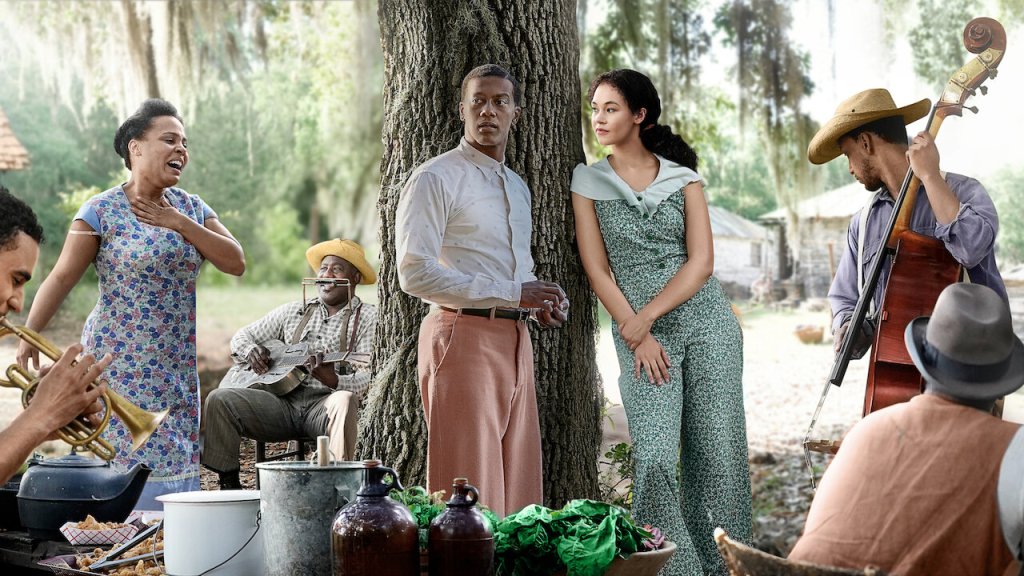
Tyler Perry turns his melodramatic eye on the recent past for his latest, a jazz-and-blues in 1940s Georgia tale titled “A Jazzman’s Blues.”
It’s about race relations under Jim Crow, when miscegenation was a multi-syllable word even the trashiest rednecks could pronounce, when “passing” for white had its perils and when jazz got serious about integration, at least in the cities of the north and west.
Perry’s cooked-up a soapy, sad story of a love-that-could-never-be framed within a little old lady’s efforts to get justice for a murder that happened 40 years before the story’s fictive present — 1987. It’s a musically, dramatically and cinematically flat affair, as Perry leans on the hoary device of having old, exposition-filled love letters read in voice-over, makes little effort hide the fate of our murder victim, whose death isn’t “investigated” at all, and tries to pass off a middling singer as an emerging big band star.
Elderly Hattie Mae (Amirah Vann) picks the right time to hit up lawyer Johnathan Dupree (Kario Marcel) to dig into this case, she figures. He’s running for Congress, and he’s a white candidate trying to prove he’s “not a racist” in rural Hopewell County, where enough Black votes could be the difference come November of 1988.
Her “evidence” about this murder is what she remembers, but more importantly, the letters of the dead man, her son.
Bayou (Joshua Boone) was a sensitive sort, growing up in the Mississippi Delta, dismissed as useless and stupid by his bluesman Dad (J. Roger Mitchell), bullied by his taller, more manly trumpet-playing brother Willie Earl (Austin Scott).
But in those letters, the once-illiterate Bayou lets us hear how he met and fell in love with a fellow outcast, the fair-skinned Leanne (Solea Pfeiffer), nicknamed “Bucket” because her mother dumped her there to be raised by her cantankerous father.
Leanne taught him to read, shared his feelings and was yanked away — as a teen — when the mother who didn’t want to raise her (Lana Young) — showed up to intervene and prevent her Leanne from limiting her life with some poor country boy.
Bayou never lost faith, never stopped writing, even though his letters were intercepted by Leanne’s mother. He and his mother moved to Georgia. He did his time in the Army, came home and started singing in his mother’s juke joint, and pined for his lost love until the day she returned — married to a white man (Brent Antonello), brother to the racist sheriff (Brad Benedict), passing for white herself.
When Bayou’s prodigal brother returns, he has a Jewish emigre and would-be agent (Ryan Eggold) with him. That means Bayou might graduate from singing “Let the Good Times Roll” at his mama’s place, if he can just get discovered.
Yes, the tropes and cliches line up at the door for this pokey, corny and old-fashioned potboiler.
The cast, made up of lesser-knowns and unknowns, doesn’t manage to make most of the characters interesting or the situations that engaging.
The music’s OK, but all over the place in terms of quality. Our “new star waiting to be discovered” couldn’t have won a talent show in any town big enough to be worth mentioning, much less succeeded at a major Chicago club’s showcase.
The entire affair plays out like a middling TV movie, with the “murder” not ever investigated, simply explained via a two hour back story that is the film’s “plot.” Perry barely wrestles with the terror of trying to pass for white in the rural Deep South and brushes by other can’t-miss sources for drama just to keep this drifting movie moving.
There’s no suspense, little that’s thrilling or that justifies any investment in this dawdling melodrama with music. At least Netflix’s accountants are happy. This didn’t cost “White Noise” or “Slumberland” money. But expect them to ask “Madea” to make an appearance next time, if they’re staying in the Tyler Perry business.
Rating: R, violence, drug abuse, sex, profanity
Cast: Joshua Boone, Amirah Vann, Solea Pfeiffer. Austin Scott, Ryan Eggold and Brad Benedict.
Credits: Scripted and directed by Tyler Perry. A Netflix release.
Running time: 2:07

